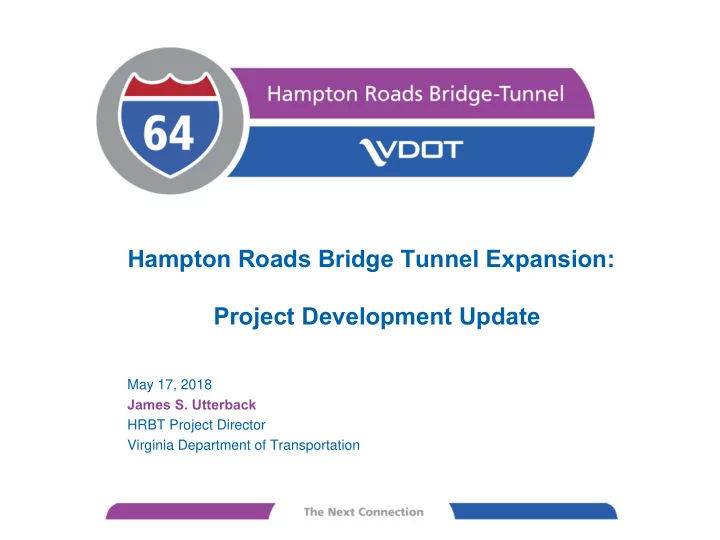

Hampton Roads Bridge Tunnel Expansion: Project Development Update May 17, 2018 James S. Utterback HRBT Project Director Virginia Department of Transportation
5/17/2018
Ten Hampton Roads Tunnels Chesapeake Channel Tunnel (1964) Hampton Roads Bridge-Tunnel Thimble Shoal (1957 & 1976) Tunnel ( 1964 ) Monitor-Merrimac Memorial Bridge- Tunnel (1992) Midtown Downtown Tunnel Tunnel (1962 & 2016) (1952 & 1987) 5/17/2018 3
5/17/2018 • • • 1950 Downtown Tunnel #1 Future tunnel #11 at Thimble Shoal will be bored tunnel 1 tunnel is concrete-box immersed tube 9 tunnels are steel-shell immersed tubes 1955 Hampton Roads #1 1960 Midtown Tunnel #1 Thimble Shoal #1 1965 & Chesapeake #1 1970 65 Years of Tunneling in Hampton Roads 1975 Hampton Roads #2 1980 1985 Downtown Tunnel #2 1990 Monitor-Merrimac 1995 2000 2005 2010 2015 Midtown Tunnel #2 1976 2020 4
HRBT Expansion - Scope of Work Between Settlers Landing in Hampton and I-564 in Norfolk Improvements in I- 64 including the construction of a new 4 lane HRBT tunnel New 4 lane HRBT tunnel will serve Eastbound traffic 2 existing HRBT tunnels will serve Westbound traffic
Proposed Tunnel Alignment (Hampton Side) 6 5/17/2018
Proposed Tunnel Alignment (Norfolk Side) 5/17/2018 7
Proposed Lane Configuration for Tunnel and Approach Bridges 2+1+1 concept in each direction: 2 free General Purpose lanes • 1 full-time HOT lane • 1 peak-hour HOT lane on left shoulder • 5/17/2018 8
Tunnel Considerations Landside work has risks but is largely conventional Tunnel work is less conventional and will generate greatest risks from cost and schedule standpoint This is a rare location where both immersed-tube and bored- tunnel construction methods are feasible All ten Hampton Roads tunnels to date have been immersed tubes • Until recently, bored tunnels were not feasible in soft soils • But recent advances in technology now make bored tunnels • possible in soft soils These methods were directly compared in the nearby Thimble Shoal Tunnel procurement in 2015 5/17/2018 9
10 Immersed-Tube Tunneling (ITT) 5/17/2018
11 Immersed Tube Elements 5/17/2018
Conceptual Tunnel Section (Immersed) Utility Corridor Jet Fans Egress Corridor 12 5/17/2018
13 Tunnel Boring Machine 5/17/2018
14 Twin Bore with TBM 5/17/2018
15 Conceptual Tunnel Section (Bored) 5/17/2018
Key Differences between Bored and Immersed-Tube Tunneling Alignment ITT alignment must be further away from existing tunnel (Hampton • Roads rule of thumb about 200 feet) Bored tunnel can be much closer to existing facilities (general rule • of thumb about one diameter ≈ 50 feet) Geotechnical ITT method has limited concern for soil properties, since soil along • tunnel path is dredged out and removed Bored method is specifically tailored to local soil properties • Environmental and Permitting Section 408 coordination with marine stakeholders / federal channel • Section 103 concurrence for offshore disposal of ITT spoils • JPA permit for disposal of bored-tunnel spoils • 16 1976 5/17/2018
D-B Procurement (PPTA vs VPPA) VDOT has the authority to pursue a Design-Build (D-B) procurement under both the PPTA or VPPA: Current VDOT D-B (VPPA) template was not developed to • handle a project of HRBT magnitude PPTA provides contractual flexibility for complex risk • profile (significant construction and geotechnical risk) PPTA encourages innovation through extensive use of • Alternative Technical Concepts (ATCs) process PPTA provides for iterative process that invites feedback • and collaboration from the proposers in order to develop more responsive procurement documents 5/17/2018 17
Procurement Activities Completed to Date DATE ACTIVITY December 15, 2017 RFQ issued December 15, 2017 to February 7, 2018 Q&A period January 19, 2018 Project Information Meeting February 2018 SOQ Evaluation Manual developed February 1, 2018 Addendum No. 1 issued February 5 to 6, 2018 One-on-one meetings February 16, 2018 Addendum No. 2 issued March 2, 2018 3 teams submitted SOQs March 5 to 9, 2018 SOQ evaluation (sequestration) March 12 to April 10, 2018 Reference checks, clarification questions April 2, 2018 Selection Committee met April 26, 2018 Announcement of Short-listed Offeror- teams 18
Key Points in SOQ Evaluation Two-part Evaluation Method Pass/Fail Review Compliance and completion of submission Offeror legal information and financial capability Qualitative Evaluation Equal emphasis on General Technical Qualifications (50 points) and Tunnel Delivery Qualifications (50 points) Option to submit for either or both Immersed Tube Tunnel and Bored Tunnel methodologies
Key Points in SOQ Evaluation Qualitative Evaluation Objective is to short-list well-integrated teams that demonstrate experience in: Design and construction of large diameter roadway or rail tunnels Bridge design and construction in marine environments and in close proximity to existing structures and bridges Widening heavily-traveled environments in urban environments requiring complex maintenance of traffic Land reclamation/island construction in a tidal marine environment Construction in an active navigable channel
SOQ Submissions TEAMS Skanska – Kiewit Hampton Roads Hampton Roads JV Capacity Connector (ITT) Constructors Partners JV (ITT + BT) (ITT + BT) Lead Skanska USA Civil Fluor Enterprises, Inc. Dragados USA Contractor Southeast Inc. The Lane Construction Vinci Construction Kiewit Infrastructure Co. Corporation Grands Projects Traylor Bros., Inc. Dodin Campenon Bernard SAS Dragages Civil Works Virginia, LLC (Boygues subsidiary) Lead WSP USA Inc. AECOM Technical I-64 Design JV Designer Services, Inc. • HDR Engineering, Inc. • Mott MacDonald
Next Procurement Activities Activity Target Date Draft Request for Proposals May 2018 Alternative Technical Concept Process Summer/Fall 2018 Final Request for Proposals Fall 2018 Selection of Best Value Proposal January 2019 PPTA Statutory Audit Early 2019 Execution of Comprehensive Agreement Early 2019 No later than 60 days PPTA Steering Committee Briefing from execution of CA
23
Recommend
More recommend